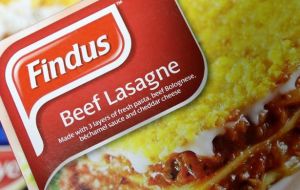MercoPress. South Atlantic News Agency
A potentially harmful painkiller bute in the horsemeat chain scandal in the EU
 UK Chief Medical Officer Dame Sally Davies said bute is also used in medicine for arthritis
UK Chief Medical Officer Dame Sally Davies said bute is also used in medicine for arthritis Horse carcasses containing the painkiller bute could have been entering the food chain in significant numbers for some time, the head of the UK Food Standards Agency (FSA) has admitted.
UK FSA chief executive Catherine Brown spoke as it was revealed authorities in Britain and France are trying to trace the carcasses of six horses contaminated with the painkiller, which were slaughtered in a UK abattoir and may have entered the human food chain across the Channel.
The drug, which is potentially harmful to human health, was detected in eight horses out of 206 tested by the Food Standards Agency in the first week of this month. Two were intercepted and destroyed before leaving the slaughterhouse but the other six were sent to France, where horse meat is commonly eaten.
Ms Brown told a press conference at Defra headquarters that FSA had increased testing of horse carcasses over a three-month period last year after intelligence from abattoirs suggested bute was getting into the food chain.
Meanwhile, tests on Findus processed beef products withdrawn from sale in the UK after the discovery of traces of horse meat found no evidence of phenylbutazone - or “bute” - which is banned from products intended for human consumption.
UK Chief Medical Officer Dame Sally Davies said that although the drug was linked to side-effects in patients who have been taking it as a medicine for arthritis, the risk was very low.
“If you ate 100% horse burgers of 250g, you would have to eat, in one day, more than 500 or 600 to get to a human dose,” she said. “It would really be difficult to get up to a human dose.”
The highest level of bute found in tests was 1.9 milligrams per kilo of meat, she said.
Meanwhile, a processing factory in Co Monaghan in the Republic of Ireland withdrew some batches of burger products produced for the UK market, some of which tested positive in the UK for 5% to 30% horse meat.
Rangeland Foods said the burgers, which contained beef supplied from Poland, date back to production in September and were specifically produced for the UK market and made to a specification for EU beef from EU-approved suppliers.
Primary investigation also showed that the owner of an abattoir caught up in the horse meat scandal is contracted to remove fatally injured horses from the Grand National.
Peter Boddy, whose slaughterhouse in West Yorkshire was raided by the Food Standards Agency (FSA) this week, removes the carcasses of some horses which have been put down during the world famous meeting, Aintree Racecourse said. The Liverpool racecourse said it was “confident” no unfit meat had entered the food chain.





Top Comments
Disclaimer & comment rules-

-

Read all commentsAnd on top of THAT, this:
Feb 15th, 2013 - 07:01 pm 0http://www.reuters.com/article/2013/02/14/us-horsemeat-walmart-idUSBRE91D1EA20130214
Gosh, last year it was deadly alfalfa sprouts that killed dozens in Germany, Sweden, Netherlands... before it was Mad Cow contagion in the UK, before that the water in Spain, now this.
What an awful place to live.
Even horse racing is affected now. At a recent meeting a horse refused a jump and the trainer was heard to mutter, “that horse was chicken”.
Feb 16th, 2013 - 11:15 am 0Commenting for this story is now closed.
If you have a Facebook account, become a fan and comment on our Facebook Page!